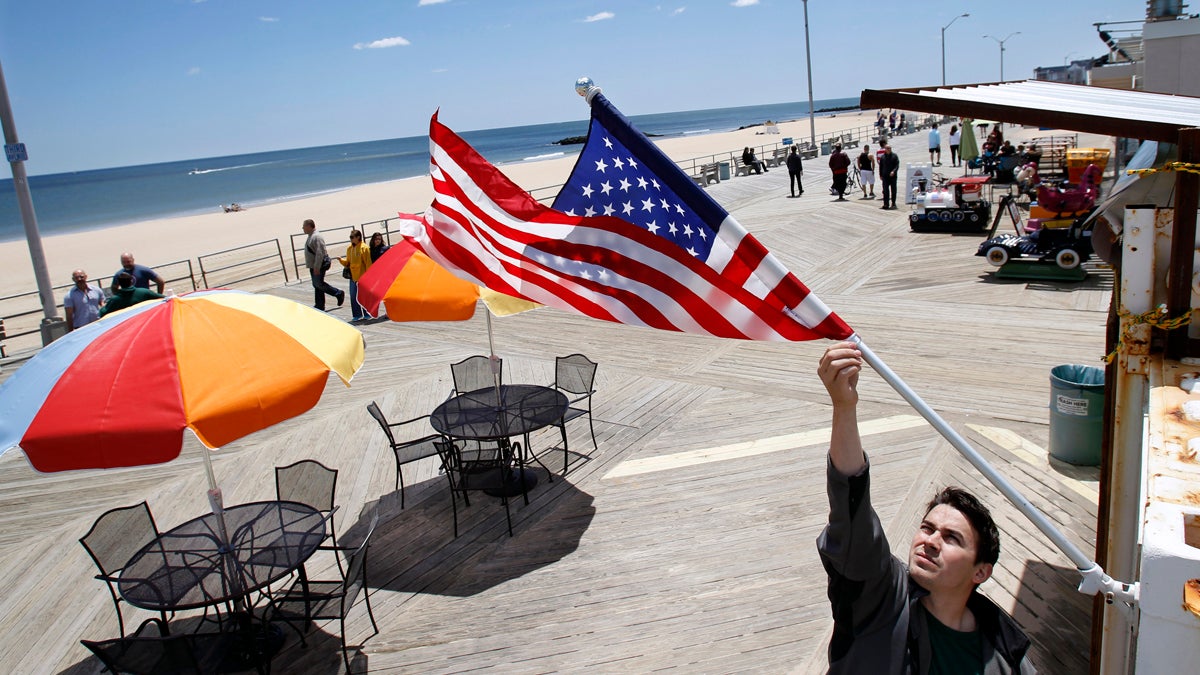5 ways to support your favorite Jersey Shore eateries

A boardwalk restaurant in Asbury Park, N.J., where one of Marilyn Schlossbach's businesses is located, opens on a recent Sunday morning. While Superstorm Sandy recovery continues, the Jersey Shore to a large extent has been cleaned up, rebuilt, and reopened. (AP Photo/Mel Evans)
From basic clean-up to rebuilding and start-up, many Jersey Shore restaurateurs have discovered they are on their own — without unemployment benefits and without cash flow.
Three years ago, a New York Times New Jersey Dining article described Marilyn Schlossbach as a waitress who had gone on to become owner of a mini-empire. Last year, her empire included seven eateries in Ocean and Monmouth counties.
Six months ago, after Superstorm Sandy, Schlossbach stood in one of her restaurants with all the windows blown out, eight feet of water in the basement and the entire contents a loss. She figured this was the worst part of the nightmare.
“As Sandy approached, I thought I was covered. I even said we are lucky,” Schlossbach said. “Instead, this has been the most challenging six months of my life. Everyday there is another hurdle.”
Schossbach is among the many restaurateurs up and down the Shore whose business policy insurance claims have been denied. Landlords carry the flood insurance on the building, and most of those claims are being dealt with. What isn’t being paid are claims by the businesses on their separate policies for spoilage, contents and loss of business.
From basic clean-up to rebuilding and start-up, they have discovered they are on their own — without unemployment benefits and without cash flow. Add to that a four-month mandatory evacuation period, and the financial picture becomes more urgent.
Some progress
Marilou Halvorsen, president of the New Jersey Restaurant Association, sees progress despite the problems. “Small businesses just know how to get things done, no matter what,” she said.
One way Halvorsen tracks recovery is by the number of food distributors getting accounts. They reported an increase in orders as Memorial Day approached.
Halvorsen also gives credit to the generous nature of the hospitality industry. They supported not only each other, but also fed workers and the community during recovery.
For Schlossbach sheer determination has been a driving force. She raised nearly $18,000 on her GoFundMe site, applied for grant money and found help from volunteers and Home Depot.
Schlossbach worries about the future. “I never thought I’d borrow this much money, but a lot of people are dependent on us,” she said.
Still, both Schlossbach and Halvorsen said there are positives. Schlossbach says she is making better choices for her company and has engaged in some strategic planning — something she might not have done without having to rebuild the company. Six of her seven establishments are coming back.
Halvorsen sees all the boardwalks open, and businesses are coming on line every day. “We now know it can happen here, so everyone is better prepared for emergencies,” she said.
Halvorsen should know. Her first day on the job at the New Jersey Restaurant Association was Oct. 29 — the day Sandy hit.
Five things you can do to help Jersey Shore recovery
1. Go. Nothing shows support like showing up and spending money.
2. Don’t obsess over what is open and what isn’t. Most businesses are back, but if your favorite place isn’t, it may yet return. Plenty of places are open. The stronger the economy of the entire community, the easier it will be to support the businesses having a harder time coming back.
3. Have patience. Getting ready for the season has been challenging this year and staffing unpredictable. If your meal takes a little longer to get out, or service is uneven be forgiving and know the kinks will get worked out.
4. Bring back some favorite foods and share with your neighbors. Whether it’s the traditional salt water taffy, desserts from a local bakery, or ingredients from a gourmet specialty shop, it’s great word-of-mouth advertising for businesses.
5. Tell others what a good time you had, and keep coming back.
—
Lari Robling is an independent radio producer and the author of “Endangered Recipes: Too Good to Be Forgotten.”
WHYY is your source for fact-based, in-depth journalism and information. As a nonprofit organization, we rely on financial support from readers like you. Please give today.

